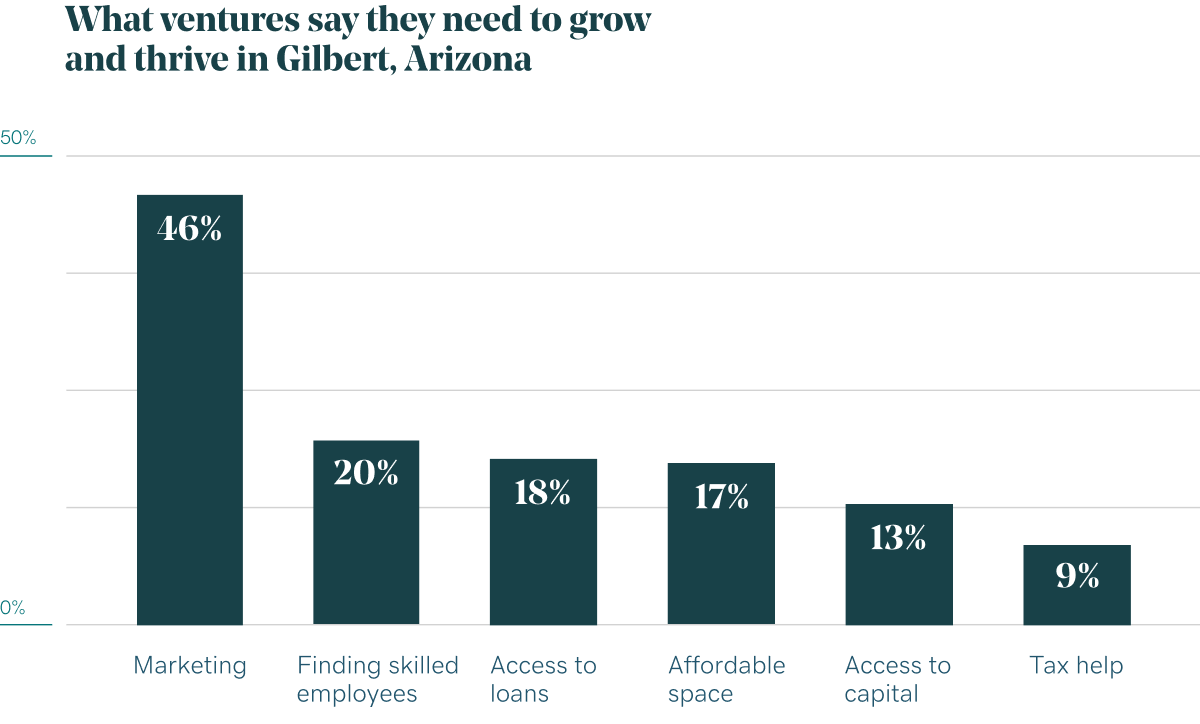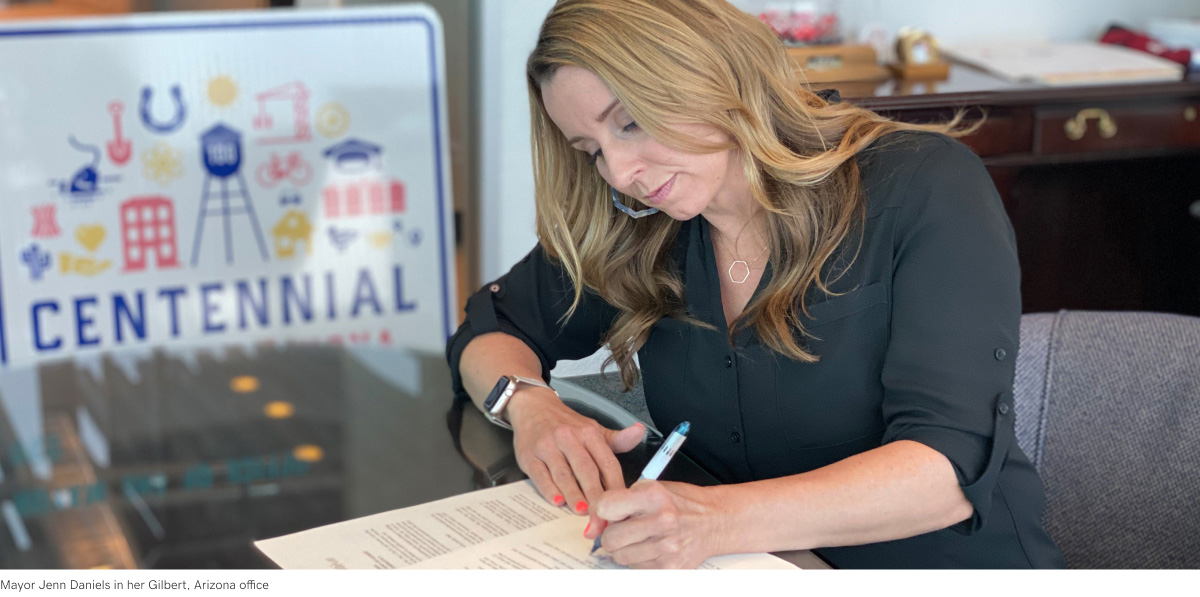As a 12-year-old, Jenn Daniels taught herself bookkeeping so she could help her father run his tool-and-die shop. Nearly 30 years later, she uses those skills as part of a side business she runs out of her Gilbert, Arizona, living room helping entrepreneurs navigate the tricky shoals of local permitting, state licensing, tax filing, insurance and a string of other challenges.
Daniels is qualified to help for an additional reason: She has been mayor of this 260,000-person town southeast of Phoenix since 2016.
Her role setting policy combined with firsthand experience with the challenges entrepreneurs face — the property where her father’s shop sat was seized by eminent domain and turned over to a soda bottling plant — has given her a heightened appreciation for the role even the smallest businesses play in a community.
“I meet with our local business owners on a daily basis, but it’s our small entrepreneurs that have caught my eye and that are so important to our community,” says Daniels.

Yet just how big an economic contribution they make only became clear to Daniels recently when she reviewed data from Venture Forward.
The program, which combines information about GoDaddy’s 19 million U.S. domain-name websites with data from the Census Bureau, Bureau of Labor Statistics and similar sources, quantifies the impact of these “ventures” on the American economy and individual communities.
The data showed more than 35,000 ventures in Gilbert, or 17.2 for every 100 residents, making it one of the more venture-dense places in the U.S. (Nationally, the rate is 3.2.)
“I don’t think I realized the magnitude of their size and impact,” says Daniels. “I could go to either side of my own house and meet someone running a venture.”

To get a better understanding of how to help nourish these ventures and encourage new ones, Daniels and her team worked with GoDaddy to survey ventures based in Gilbert. The survey, conducted among 226 GoDaddy customers there, found that Gilbert has a high rate of ventures that provide a primary income (22.6%), supplemental income (41.6%) or employ people (28.8%). It also surfaced key areas where Gilbert could do more to help ventures.
“The research has caused us to have some conversations about these ventures,” says Daniels. “How do we support this population? How do their needs differ from other businesses? What tools and resources do they need to grow?”
Who are these ventures and how can we help?
For decades, government figures have tracked small businesses, defined as having 100 or fewer employees, and their impact.
There’s some overlap between small businesses and ventures — many small businesses have websites, after all. But there are many more venture operators who haven’t registered as businesses or who run their websites on the side and whose businesses don’t get picked up in government data.
Analysis shows ventures strengthen the financial health of communities and make them more resilient to economic shocks like the COVID-19 crisis. According to the latest Venture Forward data, cities with higher concentrations of ventures suffered less job loss and had lower unemployment rates in April 2020, when both metrics reached record highs.
The research also found that highly active ventures — those that contain many links across the internet, have significant traffic and features like payment portals — have an outsized impact on a community’s ability to recover from a recession. Adding one highly active venture per 100 people in a county can increase median income by $408, or 11.3% over the standard increase 2016-2018.
Related: How micro-businesses have blunted the economic impact of COVID-19
According to the survey, three-quarters of venture respondents say they’re contributing to the local economy by generating income or employing people. For surrounding Maricopa County, which GoDaddy also surveyed, about two-thirds of venture operators generated income or employed people.

“One of the questions local governments ask themselves is ‘what’s the competitive advantage to my area?’” says Karen Mossberger, a public affairs professor at Arizona State University, who conducted analysis for the Venture Forward study. In Gilbert, she says, “It looks like these ventures are an interesting part of that picture.”
Gilbert, which recently celebrated its centennial, was originally a farming community fueled by commerce from a railroad that runs through the town. The town has experienced considerable growth since 1980 when its population was just 5,717.
Today, it’s an economically diverse suburban center in the southeast valley of greater Phoenix.
According to recent census data, Maricopa County, which includes Gilbert, is mostly white and Hispanic; 34% of residents hold a college degree; the median household income is about $89,000; per capita income is $35,559.
While the Gilbert survey doesn’t say why ventures are taking hold there — though education, access to broadband, and the presence of IT jobs are national factors in venture growth — it does address the points that Daniels is most interested in: What tools do they need to start and thrive?
Getting to yes
To start their ventures, the Gilbert respondents listed three primary obstacles. Among them were marketing (48.8%), followed by access to capital (28.3%), and then by help with permitting and licensing (27.7%). Once established, their concerns shift slightly. Marketing remains the top challenge (46%), followed by help finding skilled employees (19.6%) and access to loans (17.8%).
“Gilbert looks nationally at cities like Austin, Nashville and Denver for best practices,” says Dan Henderson, Gilbert’s economic development director. “The town council just approved a pilot program that will offer technical assistance and training for small ventures.”
In addition, Gilbert is piloting a public-private partnership with small businesses for marketing. The town contributes 80% of the funds and the private sector contributes 20%, which will be used for a range of online and offline activities.
Daniels and Henderson would like the pilot to become permanent and plan to extend its reach. “We’re inviting ventures into the program,” says Henderson, and the cost to participate would be close to nothing.

Gilbert is also looking for ways to help ventures with networking.
Some 12.7% of survey respondents said a lack of networking opportunities (with potential backers, suppliers and local media influencers) is an obstacle to starting a business. Another 10.4% cite it as a challenge to growth.
The local chamber of commerce has always been a popular choice for many local businesses seeking to network. “But I don’t think any venture is looking to spend $300 for a membership fee,” says Daniels. “So how can we connect them, build a network without cost?”
One solution, says Daniels, is to create a physical environment for them to gather and work, “where creativity can flourish and be a catalyst for new growth and ideas,” says Daniels. In Gilbert, that includes creating pocket parks and other open space that’s Wi-Fi-enabled.
Networking also means connecting ventures with the kind of people who may have $50,000 to invest — not enough to be a venture capitalist, but enough money for a micro-business to launch and survive.
“We’re also developing an entrepreneurship network,” says Henderson, which is providing what Gilbert survey respondents said they needed most: access to angel investors as well as coaching and mentoring services. Henderson adds, “This study data has really changed the way we’re approaching our economic development programming services.”
Looking forward, not backward
When consulting clients arrive at Mayor Daniels’ home, “They come to me because they’re in a mess and they got in trouble,” says Daniels. “Their business has either been set up improperly or they’re in some sort of tax or financial and permitting trouble.”
Daniels helps them with things like figuring out if they’re properly insured, introducing them to an accountant to make sure they’re set up properly, helping them figure out what licenses are needed and how to navigate local business requirements.
“That’s my side hustle and I see this fairly regularly,” says Daniels. “People just look at government processes especially as a huge obstacle to access success.”

She’d like to see less of that. And she’d like to lower those bureaucratic barriers. She believes small things can help.
“We’ve been talking about removing the requirement to home-based businesses, which is $15 to renew annually. But frankly, what are we using that money for? It goes into a general fund. If we can eliminate that little barrier, that can make your life easier.”
She’d also like to do away with certain punitive fines.
Beyond that, she wants to create a town culture where residents feel free enough to create and innovate.
“In Gilbert, we talk a lot about building the city of the future,” says Daniels. “A lot of conversations we’re having are around race and civil unrest and what we’ve been experiencing. We have to ask ourselves, are we building the people of the future? And what skills will they need? And how can we help? That’s what’s important.”
The post How Gilbert, Arizona, found economic resilience in 35,000 micro-businesses appeared first on GoDaddy Blog.




